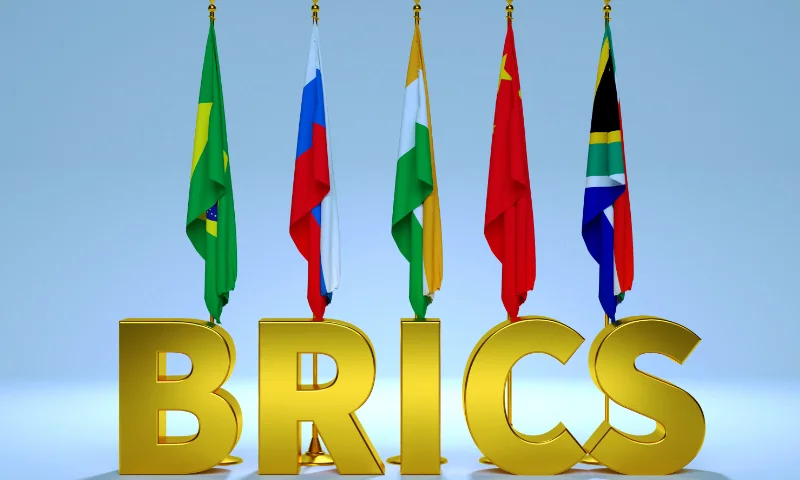India has expressed its reservations about Pakistan’s aspiration to join the BRICS group of emerging economies, citing the lack of consensus and the historic rivalry between the two countries.

India has recently articulated its stance regarding Pakistan’s aspiration to join the BRICS (Brazil, Russia, India, China, South Africa) alliance, a group of major emerging economies that aims to foster cooperation and influence in global affairs.
Arindam Bagchi, the spokesperson for India’s Ministry of External Affairs (MEA), addressed this topic during a press conference on December 7, 2023. While responding to queries about Pakistan’s intent to join BRICS, Bagchi’s statements suggested that India might exercise its veto power against Pakistan’s induction into the alliance.
This development is noteworthy, considering the longstanding strained relations between the two neighboring countries, which have fought four wars and several skirmishes over the disputed territory of Kashmir.
BRICS Membership Expansion Requires Consensus
The induction process into the BRICS alliance is guided by a consensus among existing members, which was agreed upon during the 15th BRICS Summit in Johannesburg, South Africa, in 2023.
Bagchi emphasized this point, stating that all decisions within BRICS are made based on consensus. His remarks implied that every member nation, including India, would have a significant say in introducing new members. This protocol will be pivotal in determining the outcome of Pakistan’s application to join the group.
The backdrop of India and Pakistan’s historic rivalry, marked by decades of diplomatic tension, adds complexity to this situation.
Pakistan Faces Obstacles in Joining BRICS
Pakistan’s endeavor to join BRICS faces considerable challenges. While the country has sought support from China and Russia for its induction in 2024, the path is fraught with obstacles.
The intricacies of BRICS membership, involving various principles, norms, criteria, and procedures, set a high bar for any new entrant. These factors, coupled with the existing geopolitical dynamics, particularly India’s potential veto, signify that Pakistan’s journey to BRICS membership will be far from straightforward.
Pakistan officially confirmed its application for BRICS membership on November 23, 2023, stating that it can play an important role in furthering international cooperation and revitalizing inclusive multilateralism.
Pakistan has a close relationship with China, which is the largest economy and the most influential member of BRICS. The rival applicant also hopes to gain the backing of Russia, which will host the next BRICS summit in 2024, and has expressed its intention to expand the group’s reach and impact.
However, Pakistan’s bid for BRICS membership may face opposition from other members, especially India, which has accused Pakistan of sponsoring cross-border terrorism and violating human rights in Kashmir.
India-Pakistan BRICS Rivalry Reflects Global Power Shifts
Overall, India’s recent statements on Pakistan’s bid to join BRICS have brought to light the complexities of expanding the alliance, which reflects the shifting global power dynamics and the rising influence of emerging economies.
BRICS, formed in 2010, was initially comprised of Brazil, Russia, India, China, and South Africa. However, at this year’s summit, the group announced the admission of six new members, namely Argentina, Egypt, Ethiopia, Iran, Saudi Arabia, and the United Arab Emirates, which will join the group in 2024.
This expansion is seen as a way for BRICS to enhance its role and voice in global governance and to challenge the dominance of the US and its allies.
India and Pakistan are two nuclear-armed rivals that have a complex and largely hostile relationship stemming from the partition of British India in 1947 and the subsequent dispute over Kashmir.
The two countries have also been competing strategically for regional and global influence, with Pakistan seeking to counter India’s growing clout and aspirations.
BRICS is a group of major emerging economies that aims to foster cooperation and influence in global affairs. Some of the BRICS members, such as China and India, have taken a hostile stance towards cryptocurrencies. In contrast, others, such as Russia and South Africa, have shown more openness and interest.
Pakistan’s bid to join BRICS may reflect its desire to diversify its foreign policy options and gain access to new markets and resources, including the crypto sector.
However, India’s potential veto could dash Pakistan’s hopes of joining the group. It could also strain the relations between India and other BRICS members, especially China and Russia, which are more supportive of crypto innovation.
